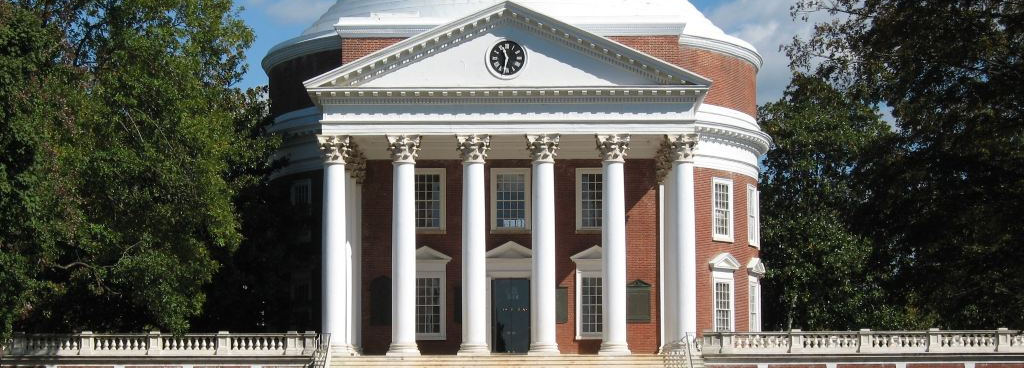Updated: Tuesday, August 12, 2025
How to Get into UVA: All You Need to Know

The University of Virginia is one of the most competitive and exclusive public universities in the country. It was famously founded by one of the Founding Fathers, Thomas Jefferson, in Charlottesville, Virginia. UVA boasts a beautiful and sprawling campus that those in the know lovingly call “Grounds.” A campus quad is located within Grounds, known as “the Lawn,” where students attend classes, participate in student activities, and keep UVA traditions alive.
UVA has become an increasingly popular college for applicants from across the country. It takes a smart, engaged, critical thinker to excel at a place like UVA. If you long to be among the Cavaliers — also known as Wahoos or Hoos — it’s important to set yourself apart to increase your chances of admission.
How to Get into UVA: Table of Contents
- When to Apply to UVA
- How Hard Is It to Get into UVA: Early Prep
- How Do You Actually Get into UVA: The Application
- Class Profile
- What Makes UVA Unique?
- UVA FAQs
When to Apply to UVA
The University of Virginia offers different admission options and deadlines. Though the exact dates of the deadlines vary slightly from year to year, they follow the same general timeline. It’s important to familiarize yourself with these application types and deadlines as you consider your options.
UVA Deadlines
Understanding different application options and deadlines is an important part of your application strategy. UVA’s deadlines for students applying for fall 2026 admissions are:
- November 1: Early Decision
- November 1: Early Action
- January 5: Regular Decision
Students who apply Early Decision can expect a decision by December 15. Early Action decisions are released by February 15. And Regular Decision applicants will receive a decision by April 1.
Early, Rolling, and Regular Decision
The University of Virginia offers three different application types: Early Decision, Early Action, and Regular Decision. Early Decision and Early Action are good options for students with strong grades throughout high school who feel their profile is competitive without their first semester senior grades. However, they are significantly different.
Early Decision is a binding agreement, meaning you agree to enroll if you are admitted and withdraw all other applications. You can only apply to one school Early Decision. If UVA is your top-choice school and you are absolutely certain you want to be a Cavalier, applying Early Decision might be right for you.
Early Action is non-binding, meaning you still get your results early but are not committed to enrolling if admitted. You can apply to multiple places Early Action (as long as they are not Restrictive Early Action or Single Choice Early Action).
Regular Decision is a standard, non-binding application type. This is the best option for students who need more time to prepare their application and/or submit midterm grades.
While not offered at UVA, rolling admission is another common application type. Schools that offer rolling admission do not have a strict deadline and continue admitting students until the class is full.
Waitlisted Applications
In the Regular Decision round, three possible decisions are released: admitted, denied, or waitlisted. If you are waitlisted, you have the option of accepting or declining your spot. However, you may want to consider enrolling at another school that admitted you. Out of the 6,759 students who accepted a spot on the waitlist for fall 2024 admission, only 242 were ultimately admitted
Deferrals
Students who apply Early Decision or Early Action at UVA will receive one of three decisions: admitted, denied, or deferred. If you are deferred, your application will be reconsidered during the Regular Decision round. So, what should you do if you’ve been deferred? UVA requests that you or your counselor submit updated midyear grades as soon as possible.
How Hard Is It to Get into UVA: Early Prep
UVA is one of the most competitive public universities in the country, with the selective admission rates to prove it:
- Class of 2026: In-state: 27.58%; out-of-state: 15.21%
- Class of 2027: In-state: 27.58%; out-of-state: 13.18%; international: 11.50%
- Class of 2028: In-state: 25.93%; out-of-state: 13.83%; international: 10.46%
- Class of 2029: In-state: 23.00%; out-of-state and international: 12.50%
As a public university, UVA serves in-state students first and prioritizes Virginia residents. This means that the competition for UVA admission for out-of-state students may be more competitive. To improve your chances of being admitted to UVA, it’s important to understand the application process and get started as early as possible.
Build Your Profile
So, what does the University of Virginia look for in applicants? UVA values students from all walks of life who will contribute to a vibrant and engaging exchange of ideas across Grounds. A holistic review process is used to evaluate students for admission. This means that hard factors are taken into account, like grades, rigor, curriculum, and test scores, as well as soft factors, like extracurricular activities, essays, and letters of recommendation.
The admissions committee at UVA will look at all four years of high school. Therefore, it’s important to be strategic about building a competitive profile starting from ninth grade so you can highlight your greatest strengths and what UVA admissions officers look for on your application.
Visit the Campus
One of the best ways to find out if UVA might be the right fit for you is by visiting the campus. UVA offers multiple options to explore Grounds. The in-person visit includes a welcome from the dean of admission and a student-led tour of Grounds. This is an excellent opportunity to see the campus and learn from current students. You can also take a self-guided tour at any time.
If you are unable to travel to Charlottesville for an in-person tour, you can also visit UVA virtually. You can register for a virtual information session and take a virtual tour of Grounds.
Connect with a Student
Connecting with a current UVA student is one of the best ways to learn if the university is a good fit for you. You can connect with a student by registering for a tour so you can ask the student tour guide questions about campus life and their experience as a student.
Learn About Any Student Experiences
You can learn about student experiences through UVA’s website or by visiting campus. You can also learn about student experiences through UVA’s social media pages and the student-run campus newspaper, The Cavalier Daily. UVA students tend to be very involved across Grounds. A day in the life of a UVA student might include a wide variety of activities, including classes and extracurricular and service activities. Following UVA’s website and social media pages will help you learn about current student experiences and decide if UVA may be a good fit for you.
How Do You Actually Get into UVA: The Application
Getting into UVA is no easy task — it requires advanced preparation and a strong, holistic application with impressive hard and soft factors. You will submit your application materials to UVA via the Common Application. Start as early as possible on your application so you have time to receive feedback and revise.
GPA Requirements
UVA doesn’t have any official GPA requirements for admission, though they consider it very important. In fact, 90.5% of the class of 2029 reported a high school GPA of 4.0 according to UVA’s 2024-25 Common Data Set. This tells you that to be a competitive applicant, you must earn the highest grades possible.
SAT and ACT Scores
UVA is currently test optional for fall 2026 admission. However, if your SAT or ACT scores are competitive, submitting them could give you a competitive edge. Of the students who submitted test scores for fall 2024 admission, the middle 50% had a score range of 1410-1520 on the SAT and 32-35 on the ACT. If your scores fall within this range, consider submitting them with your application, keeping in mind that UVA superscores both tests.
Personal Statement
The personal statement is one of the staples of the college application process. Students can choose from seven Common App essay prompts and write a response of approximately 650 words. It’s important to be authentic and honest in your personal statement, since admissions officers are eager to get to know the real you.
Essays
For the 2025-26 admissions cycle, the University of Virginia will require a supplemental essay only from applicants to the School of Nursing.
Describe a health care-related experience or another significant interaction that deepened your interest in studying Nursing. (300 words).
Letters of Recommendation
UVA requires two letters of recommendation: one from a teacher and one from your high school counselor. Request a letter of recommendation from a teacher who can speak to your academic ability and knows you well enough to discuss your character and contributions to your school. Submit your recommendation letter request with a copy of your resume and some highlights of your best work. This will remind your teacher what to highlight in their letter of recommendation.
Admission Interviews
Admission interviews can be an important part of the admissions process, contributing to the soft factors of your application. However, UVA does not offer admission interviews.
Contribution to the UVA Community
UVA students contribute to the community in myriad ways, from their activity on Grounds to their involvement in the Charlottesville community. Highlight in your application the ways you have contributed to your school and community so the admissions committee can picture how you will make an impact on the UVA campus and beyond.
Class Profile
Looking at data for the most recently admitted classes can provide you with valuable information about demographics and admissions outcomes. Here are a few statistics for the class of 2028.
| Acceptance rate | 16.81% |
| Class size | 3,961 |
| Undergraduate majors | 75+ |
What Makes UVA Unique?
UVA has a unique history. Founded by Thomas Jefferson in 1819, UVA has built itself on its original goals: “to advance human knowledge, educate leaders, and cultivate an informed citizenry.” Along with Jefferson’s home, Monticello, UVA is designated as a UNESCO World Heritage Site. Grounds is considered one of the most beautiful colleges campuses in the nation.
Since 1842, students at UVA have administered the Honor System, a cherished tradition that guides student behavior. During Convocation, new students sign the Honor Code and are welcomed into the UVA community. Students who violate the Honor System are sanctioned by a jury of their peers.
Students at UVA are not freshmen, sophomores, juniors, or seniors — instead, they are first-year, second-year, third-year, and fourth-year students. This is because Thomas Jefferson believed that education is a lifelong endeavor, and describing a fourth-year student as a senior implies that their learning is coming to an end.
The University of Virginia was founded to promote the greater good — a mission that is still upheld today. Approximately 80% of the student population volunteers, completing over 100,000 community service hours per year through Madison House. Students also have more than 700 clubs to choose from, allowing them to pursue a wide range of interests.
UVA FAQs
Where is the University of Virginia?
UVA is located in Charlottesville, Virginia.
What is the University of Virginia’s acceptance rate?
The acceptance rate in recent years has been under 20%: 18.68% for fall 2022, 16.86% for fall 2023, and 16.81% for fall 2024.
Is the University of Virginia a good school?
UVA is consistently ranked as one of the top public universities in the U.S.
What is the University of Virginia known for?
UVA is primarily known for being founded by Thomas Jefferson in 1819. The university is a UNESCO World Heritage Site. Aside from its history, UVA has a stellar academic reputation and a strong culture of community service.
What are some notable alumni of the University of Virginia?
UVA boasts many notable alumni that have made significant contributions to their fields. Among the most well-known are Katie Couric, Tina Fey, Brit Hume, Edgar Allan Poe, Tiki Barber, Robert Mueller, Robert F. Kennedy, Ted Kennedy, and Woodrow Wilson.
Does the University of Virginia have supplemental essays?
UVA has one required supplement for students applying to the School of Nursing for fall 2026.
Admission Counseling
Because UVA is such a competitive school, students hoping to gain admission can benefit from the guidance of a college admissions counselor. A qualified counselor understands exactly what admissions committees look for when they’re reviewing applications. They can help you highlight your academic strengths and extracurricular interests to maximize your chances of admission.
At IvyWise, all our college admissions counselors have sat in committee at some of the top colleges and universities in the U.S. They know firsthand what it takes for students to gain admission into highly selective schools. If you dream of being a Cavalier, schedule an Initial Consultation to learn how we can help you achieve your academic goals.
Get the IvyWise Newsletter
Related Posts

In-State and Out-of-State Colleges: Acceptance Rates, Public Universities, Tuition
Choosing between in-state and out-of-state colleges is an important decision that can significantly impact your college experience. In-state institutions often offer financial advantages, with lower tuition costs and potential access to state-funded scholarships. However, out-of-state colleges may provide unique opportunities, diverse cultural experiences, and access to specialized programs not available locally. Keep reading to learn more about in-state vs. out-of-state colleges.

Grammar and Spelling Mistakes to Avoid in Your College Essay
Few things are scarier to students than submitting their college application only to find grammar and spelling mistakes afterward. This can lead to panicked calls to counselors and colleges, asking to resubmit their essays or correct an error. While small grammar and spelling mistakes won’t kill your college admission chances, they can lead to a lot of additional headaches for already stressed-out students.

